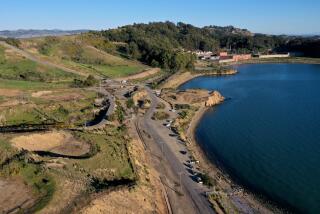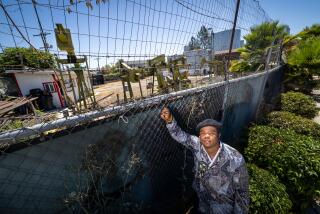‘Who Bombed Judi Bari?’ documentary seeks an answer
Reporting from Garberville, Calif. — — Judi Bari’s name may not be as familiar as Erin Brockovich’s or Karen Silkwood’s, but her life of activism — fighting the logging of old-growth trees in Northern California — was no less cinematic. Now, 15 years after her death, a new documentary, “Who Bombed Judi Bari?” brings the carpenter, fiddler, union organizer and Earth First firebrand to the big screen.
Bari spearheaded efforts in the 1980s and ‘90s to slow logging on the state’s northern coast. In 1990, while organizing logging protests, an explosion tore through her car in Oakland and nearly killed the 40-year-old single mother of two. Authorities initially claimed she and her passenger, Darryl Cherney, had been transporting explosives, but the pair insisted they had been framed by the FBI and Oakland police.
Bari died of cancer in 1997, five years before she was vindicated by a federal jury that awarded $2.9 million to her estate. The jury found that FBI agents and Oakland police officers violated her civil rights in their handling of the investigation. But the question of who planted the bomb remains.
Cherney hopes the movie will help finally solve that mystery — and inspire a new generation of activism by highlighting the victories Bari and her cohorts won.
“We want to show who Judi Bari was, as a woman and as a historical figure,” said the ebullient Cherney, an Earth First activist and musician, rattling around his mountain home above the Eel River outside of Garberville. He collaborated with L.A.-based director Mary Liz Thomson on the film, which is being shown this week at the Laemmle’s Monica 4-Plex.
“And we wish to inspire,” he added, “by showing a string of victories in our movie, either by saving the Cahto wilderness [near Laytonville in Mendocino County], which was signed by George W. Bush; or the Headwaters Forest [Humboldt County] in the late ‘90s; or Julia Butterfly’s tree sit; and the victory over the FBI. We show that you can win.”
Heroes to many in the environmental movement, Bari and Cherney were viewed as dangerous radicals by the California timber industry. Now, most of the mills are closed and tensions between the two sides have greatly diminished, but the film nevertheless shows that there was room for an innovative — if unlikely — middle ground.
The movie — which has played in Northern California and has U.S. and European festival dates ahead — employs no talking heads or experts. Filled with humorous and pointed folk songs written by forest activists, the film is narrated by Bari herself, in footage taken from a video deposition she gave for her suit against the FBI. Given the movie’s provenance, it’s little surprise that she comes across as intelligent, driven and living the Earth First motto: No Compromise in Defense of Mother Earth. Each escalation is captured in activist video and news footage from remote logging road protests, rallies, lumber company offices and, finally, hospitals and courtrooms.
Thomson, who lived in San Francisco at the time, began filming the night of the Oakland blast. “It was absolutely chilling,” she said. “I just knew they were taken down for speaking out. You just had that feeling: Someone tried to kill them.”
Bari, an experienced union organizer in her home state of Maryland, arrived in Mendocino County in the mid-1980s. She began working as a carpenter and was upset to learn that timber giants Louisiana-Pacific and Georgia-Pacific were clear-cutting to boost profit. After the family-owned Pacific Lumber Co. in Humboldt County was taken over by Charles Hurwitz’s Maxxam Corp., cutting speed there nearly tripled.
Bullhorns and musical instruments in hand, the first direct action by Bari, Cherney and their cohorts was the blockade of the Cahto wilderness in October 1988. Cherney sang his song “You Can’t Clearcut Your Way to Heaven,” and Bari gave an impassioned speech imploring loggers to join them in a unionized timber worker-environmentalist coalition.
But the conflict quickly heated up. At another protest, one logger punched a woman in the face and another fired a shotgun in the air. Bari, Cherney and others received death threats. One widely circulated letter came from someone called the Stompers; it warned Cherney, Bari and fellow EF organizer Greg King: “if you want to be a martyr, we’ll happily oblige.”
At one point, Bari was driving with her children and Cherney when their vehicle was slammed by a logging truck they had blockaded 24 hours earlier. The car was totaled.
Undeterred, Earth First launched Redwood Summer in 1990, an audacious plan with thousands of activists to stop logging until the November vote on Prop. 130, which sought to impose restrictions on logging and fund land purchases for conservation. (The ballot initiative ultimately failed.)
On May 24, 1990, Bari and Cherney were en route to a rally when she pulled up to a stop sign in Oakland. A motion-activated pipe bomb wrapped in nails under her seat exploded, rumpling her Subaru, crushing her pelvis and backbone and driving seat springs into her body. Cherney was also injured. In the hospital, Bari said, “I begged them to let me die.”
Things then went from bad to worse. The FBI and Oakland police arrested Bari and Cherney and said they had been blown up by their own bomb. The device had been in the back seat, investigators said, maybe in a guitar case. The Bay Area’s Channel 4 news reported that “the two activists will be charged with possession and transportation of explosives.” The Santa Rosa Press Democrat headline read: “Police say Earth First! leaders knew bomb was in car.”
Despite her injuries, Bari fought back. The film chronicles defense attorney Susan Jordan’s work to dismantle the case. By July, all charges were dropped.
In 1991, Bari and Cherney sued the Oakland police and FBI, saying the government had framed them and engaged in a smear campaign to discredit their movement for sustainable logging.
A key piece of evidence in their favor was a photo of the Subaru showing a giant hole in the floorboard, directly under Bari’s seat. The back seat was intact.
The case went to trial in 2002, and three Oakland police officers and four FBI agents were found responsible for false arrest and, most important, for running a “conspiracy” to deprive Bari and Cherney of their First Amendment rights and frame them for the bombing. Cherney and Bari’s estate were awarded a total of $4.4 million. Among those found responsible was Special Agent Frank Doyle, the FBI’s local bomb expert who was influential in the case and had run what he called “bomb school” anti-terrorism courses on Louisiana-Pacific land in Mendocino.
After the verdict, Cherney immediately set about trying to make a film — a dramatic feature, at first. He and Thomson began putting together the documentary in 2009. Beyond helping to restore Bari and Cherney’s reputations, and catalyzing a new investigation into the case, Thomson believes the film is an important record of a movement.
“I want the public to have a general awareness of how these struggles get won and lost,” she said. “But also, in the same way that people maybe study the civil rights movement, to understand how social change happens, to realize that this is in that line of historical progression in our country.”
More to Read
The biggest entertainment stories
Get our big stories about Hollywood, film, television, music, arts, culture and more right in your inbox as soon as they publish.
You may occasionally receive promotional content from the Los Angeles Times.










